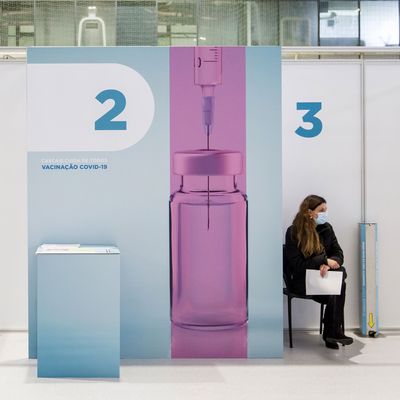
New data from the United Kingdom on Monday suggests that one shot of Pfizer’s vaccine being used across the world provides a great deal of protection after the first shot. The findings come as experts debate ways to get the most protection as quickly as possible from the limited vaccine supply, such as delaying second doses in favor of administering more first doses.
Researchers at the University of Edinburgh compared outcomes for people in Scotland who had received a first shot with those for people who had not, collecting data from 5.4 million subjects, almost the entire population of the country. Four weeks after they had gotten their first dose, hospital admissions had dropped 85 percent among those who had been given the Pfizer vaccine. With the AstraZeneca vaccine, the reduction was even greater, cutting the risk of hospitalization with COVID by 94 percent. Among people aged 80 and over, one of the highest risk groups, the combined results for both vaccines showed an 81 percent reduction in hospitalization. (The study had its limitations: Researchers did not look at whether people who were vaccinated passed it on or whether immunity waned over time, and the paper has not yet been peer-reviewed.) “These results are very encouraging and have given us great reasons to be optimistic for the future,” said Professor Aziz Sheikh, director of the University of Edinburgh’s Usher Institute. “We now have national evidence — across an entire country — that vaccination provides protection against COVID-19 hospitalizations.”
On the same day, England released initial study data on more than 23,000 medical workers that suggests that a single jab of the Pfizer vaccine cuts the risk of infection by more than 70 percent. After two doses, that rises to 85. This high level of protection even extended to the more infectious B.1.1.7, a variant of the coronavirus first found in the U.K. last fall, which has become widespread in the country and elsewhere.
The findings bolster those from Israel published last week showing the Pfizer vaccine’s effectiveness. Health-care workers who received one shot were 75 percent less likely to get COVID 15 to 28 days after the shot than their unvaccinated peers. These are the latest in a series of positive results to emerge from Israel, which has administered more vaccines per capita than anywhere else in the world, turning the country into real-life laboratory to understand if vaccines can end the pandemic.
According to Mary Ramsey, head of immunization at Public Health England, a single dose provides robust protection from the virus, which she said supports the argument for delaying the second jab and freeing up doses to inoculate more people. “The good sign is, overall, we are beginning to see a decline in hospitalizations and deaths in those vaccinated age groups, [and] at least some is attributable to the vaccination program,” Ramsay said during the press conference. She added that the findings “reinforce the policy of giving that single dose to more people to prevent more deaths and more admissions now and then going back later and getting the second dose, which will give them longer lasting protection.”





























